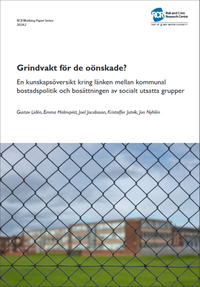Municipalities interpret refugee housing responsibility differently

The project "Gatekeeper for the unwanted? An overview of knowledge about the link between municipal housing policy and the settlement of socially vulnerable groups" examines how municipalities' housing policy can be used as a method to limit the settlement of vulnerable groups in general and refugees in particular. The results are presented in a new report.

Emma Holmqvist. Photo: Mikael Wallerstedt
– The study focuses on an overlooked dimension of housing policy, namely how it can be used as a tool to exclude vulnerable groups from long-term residence. We focus both on socially and economically vulnerable groups and more specifically on people with a refugee background, says Emma Holmqvist, researcher in Human Geography at IBF and one of the researchers behind the report.
Swedish housing policy is generally regarded as universal, i.e. the distribution of rental housing takes place based on waiting times and not need, but the public sector nevertheless handles the allocation for certain vulnerable groups in a special way. Such groups lack waiting times and have a weaker position on the labor market. Previous research shows that while some municipalities offer people with a refugee background and other socially vulnerable groups permanent housing, most only organize temporary housing solutions.
To survey the field and examine how local decision-makers can use housing policy as a tool to act as gatekeepers and thereby exclude vulnerable groups, the researchers used a systematic literature review.
The results show that different kinds of policies that aim to exclude vulnerable groups have similar effects regardless of the context in which the policy is applied. In the literature, a distinction is made between methods that intentionally exclude and when this becomes an unintended consequence. The fact that municipalities in Sweden interpret their housing provision responsibility differently leads to inequality and departures from the principle of equal treatment.
The analysis also shows that the design of laws and regulations as well as financial resources play an important role in the outcome of implemented housing policy. Not least, the phenomenon of “social dumping” plays a central role in Swedish literature. There has also been a shift in standards both in Sweden and internationally regarding what is considered society's responsibility versus the individual's responsibility in the matter of housing provision, but also that the lack of adequate housing for vulnerable groups is a serious problem both in Sweden and in many other countries.
–This shift in standards needs to be noticed and the consequences of it analyzed, so that everyone's right to housing can be satisfied in a better and more equal way, says Emma Holmqvist.
Report (in Swedish)

Grindvakt för de oönskade? En kunskapsöversikt kring länken mellan kommunal bostadspolitik och bosättningen av socialt utsatta grupper
Authors: Gustav Lidén, Emma Holmqvist, Joel Jacobsson, Kristoffer Jutvik, Jon Nyhlén
